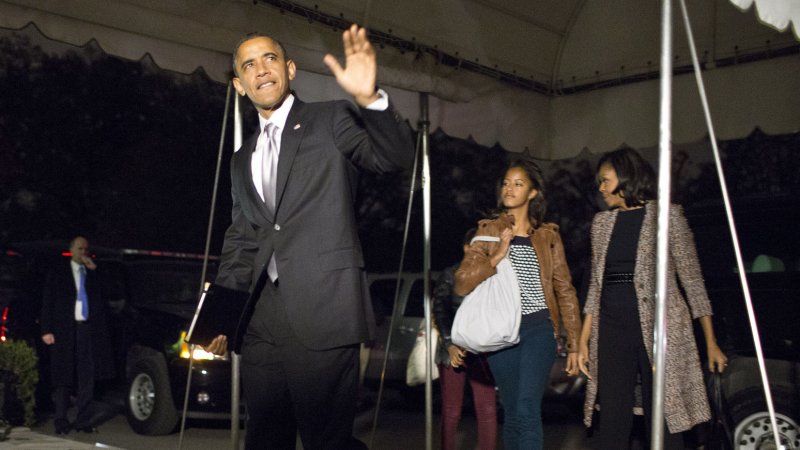U.S. President Barack Obama waves as he returns to the White House in Washington, D.C. on November 7, 2012. He his followed by First Lady Michelle Obama and his daughters Melia and Sasha. UPI/Joshua Roberts/Pool |
License Photo
WASHINGTON, Nov. 8 (UPI) -- President Barack Obama wants to quickly change Washington's "tone" by reaching out to lawmakers in both parties to tackle urgent and key issues, advisers said.
Obama, back at the White House Wednesday after winning re-election, planned to send a message to congressional Republicans and Democrats he will compromise to reach agreement on major initiatives, the advisers told several news organizations.
"He wants to effectively demonstrate that as early in this process as possible to try to set a new tone," a person advising the White House told The Wall Street Journal.
"If anything, he wants to reduce the sense of dysfunctionality that exists in Washington today by resetting the stage, and this is a reset opportunity," the person said. "You'll certainly see that as early as next week."
Obama was criticized for much of his first term for not reaching out to lawmakers of either party, the Journal said.
Obama's staff is arranging meetings with congressional leaders this week, while engaging with Democrats and Republicans more heavily next week before Obama departs for an Asian summit in Cambodia, the advisers said.
Obama called congressional leaders from both parties Tuesday night to discuss "finding bipartisan solutions" to deficit-reduction, taxes and jobs, a White House statement said.
In his Chicago victory speech early Wednesday, Obama said, "In the coming weeks and months, I am looking forward to reaching out and working with leaders of both parties to meet the challenges we can only solve together -- reducing our deficit, reforming our tax code, fixing our immigration system, freeing ourselves from foreign oil."
Obama Wednesday called House Speaker John Boehner, R-Ohio, from Chicago to discuss the need to reach a budget compromise in Congress' lame-duck session starting next week.
Boehner later told reporters at the Capitol Republicans were willing to support $800 billion in additional revenue over the next decade by eliminating deductions and loopholes, while also cutting spending and getting concessions from Democrats.
"Mr. President, this is your moment," Boehner said a day after congressional Republicans suffered election losses but kept their House majority.
"We're ready to be led -- not as Democrats or Republicans, but as Americans," Boehner said. "We want you to lead, not as a liberal or a conservative, but as president of the United States of America. We want you to succeed."
He said the GOP would want Obama's commitment to let the top tax rate fall below the current 35 percent.
He also said that in exchange for any agreement to raise tax revenue, Democrats must not "continue to duck the matter of entitlements," which he called "the root of the problem."
Senate Majority Leader Harry Reid, D-Nev., whose chamber made unexpected Democratic gains in Tuesday's election, said: "We're not going to mess with Social Security. We'll be happy to deal with entitlements, but we're not messing with Social Security."
Reid said Democrats would not be pushed around, but as a former boxer he extended an olive branch, saying, "It's better to dance than to fight."
Reid also said immigration reform would be a top Senate priority.
"The only thing we need, to get immigration reform done, are a few Republican votes," he said. "I got 90 percent of the Democrats. Couldn't we get a few Republicans to join us? So it's high on our list, and we're going to have some votes on it."
Also high on the list are roughly $700 billion in tax hikes and across-the-board cuts in federal spending set to automatically go into effect Jan. 2, known as the "fiscal cliff."
They would reduce the federal budget deficit. But economists say they would also dramatically slow down the economy.
The Washington Post said the conciliatory remarks could offer a path for avoiding the cliff.















